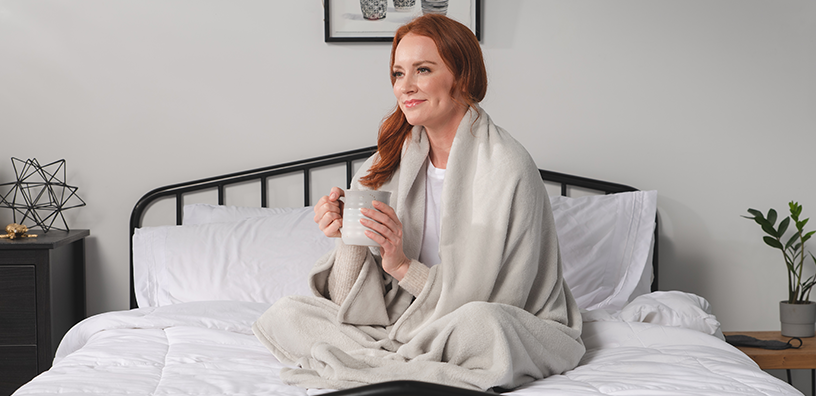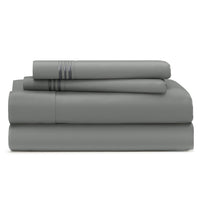
Rules for Healthy Sleep
We all know that sleep is important and everything about the way in which we sleep and our sleeping arrangements are incredibly important. Not all sleep is created equal though. Did you know that there is such a thing as healthy sleep?
Healthy sleep is deep and fulfilling, allowing you to wake up from your slumber feeling refreshed, full of energy, and ready to face the day. So what do you do if you don’t experience healthy sleep?
Check out our list of Do’s and Don’ts for achieving healthy sleep.
Don't
Drinks

“Drinks” sound pretty wide open, but we definitely don’t mean all drinks. A glass of water or a mug of hot tea can be wonderful ways to wind down before bed. What isn’t included in the “good” drinks is coffee, alcohol, and energy drinks. This may be a no brainer, but when trying to sleep, you want to avoid stimulants and caffeine when trying to sleep or unwind. So, stick with the tea!
Cigarettes

Just as the caffeine in coffee is a stimulant, the nicotine in a cigarette or cigar is as well. While your body is attempting to release melatonin, one of your hormones that sends signals to your brain to get tired, nicotine increases the heart rate and interrupts that process. You’ll find it much more difficult to get to sleep by smoking before bed.*
Overeating

There’s nothing worse than overeating and enduring a stomach ache. Now imagine a stomach ache when you’re trying to relax and ultimately get to sleep. Definitely not the most comfortable experience. Eating before bed is generally frowned upon as your body is trying to give a break to most of its functions during sleep. It’s hard to do so when there’s a mountain of food to digest in addition to having to allow itself to unwind and relax.*
Horror or Action Movies

When it comes to sleep, stimulation is the last thing you want and therefore a rush of adrenaline won’t do you any good. Both horror and action movies are incredibly stimulating to your brain.* Thoughts of what will happen next or who will win the next fight sequence might just keep you up at night.
Electronic Screens and Devices

Guess what we use every day that could be severely harming the way we sleep? If you guessed your phone, computer, or tablet, you are right! Now, in general, there’s nothing wrong with using your devices. That being said, they may be keeping you awake if used too close to bedtime. Electronic screens emit a blue light that to the naked eye is hard to perceive. That blue light stimulates your brain and keeps you awake. If there was ever a time to put down the phone and pick up a book, this would be it. Even if you use a blue light filter on your electronic device, whilst this may be a little bit better, it should still, as with the device, ideally be avoided altogether.*
Hard Exercise

You may think that exercise before bed would be a good thing. After all, wouldn’t you be more tired and fall asleep easier? A little stretching may be the perfect way to unwind before bed. However, hard and strenuous exercise will wake up and invigorate your brain and your senses, leaving you tossing and turning.*
Long Naps

While naps can be a great source of energy during the day, long naps can be detrimental to your overall sleep. Short 15-20 minute naps can increase your alertness and boost your mood. However, napping does not make up for missed sleep. In fact, taking long naps during the day can leave you feeling groggy and disoriented, depending on how long you nap for and which phase of the sleep cycle you enter and exit.* It’s better to leave extended sleep for nighttime.
Do
Walk

A simple walk around the block to get some fresh air and clear your head can be a great way to drop the day’s stress and relax into your bed.
Lowering the Temperature

Studies show one of the quickest ways to get to sleep and stay asleep is to lower the temperature of the room. Between 60 and 67 degrees, Fahrenheit is considered the optimal sleep temperature. Your body naturally decreases in temperature as you sleep and it’s thought that by changing the degrees of the room, you better facilitate this body temperature shift.* Try ventilating your room or apartment before you settle down for the night and you may find your quality of sleep drastically improves.
Read

We mentioned picking up a book when discussing ditching the screens during bedtime. As you read, your muscles begin relaxing and your breathing slows putting you in a state of calm, optimal for falling asleep.*
Air Out Room

Circulating fresh air through your room before bed is great for a few reasons. First, carbon monoxide levels lower, giving you more oxygen for a deeper sleep. Second, pollutants that might be floating around your house now have a chance to escape. Lastly, fresh air gives you more concentration and sleep study participants found that they woke up more refreshed.*
Schedule

Having a schedule is essential to falling asleep, staying asleep, and waking up well-rested. The human body loves routine. Pick a time to get ready for bed, turn off electronics, read a book, drink some tea, and turn off the light. The structure allows your mind to begin releasing those much-needed sleep hormones to get you tired and ready to snooze.*
Meditation

Meditation is all about centering one’s thoughts and taking time to focus on breathing. We have so many thoughts that pass through our heads on a daily basis, that we sometimes forget to breathe. Sit down in a comfortable spot and for just a few minutes, close your eyes, and focus on breathing. It will not only give you better concentration during the day but just like reading, it will help your muscles relax and brain settle in for bed.*
Get the Right Bedding

When it comes to sleep, it’s important to set yourself up for success. Invest in bedding that is cool and comfortable. We highly recommend bamboo viscose over other fabrics. It has been shown that bamboo viscose sheets are more breathable than cotton without compromising softness and durability. In addition, bamboo viscose is naturally hypoallergenic, so you’ll be doing less washing and more sleeping. Check out our Luxury Bed Sheets here!
Though these aren’t hard and fast rules that everyone must follow, if you find yourself struggling for sleep, give this a shot. These rules are there for you to lean on and develop further for your personal use.
Resources:
Healthy sleep: What is it and are you getting it? Sleep Foundation. (2022, April 13). Retrieved from https://www.sleepfoundation.org/sleep-hygiene/what-is-healthy-sleep.
Centers for Disease Control and Prevention. (2016, July 15). CDC - sleep hygiene tips - sleep and sleep disorders. Centers for Disease Control and Prevention. Retrieved from https://www.cdc.gov/sleep/about_sleep/sleep_hygiene.html.
Sleep basics: Rem & Nrem, sleep stages, Good Sleep Habits & more. Cleveland Clinic. (n.d.). Retrieved from https://my.clevelandclinic.org/health/articles/12148-sleep-basics.
Salamon, M. (n.d.). How to manage Blue Light for better sleep. WebMD. Retrieved from https://www.webmd.com/sleep-disorders/sleep-blue-light#:~:text=More%20so%20than%20any%20other,you%20longer%20to%20fall%20asleep.
Desk, H. T. V. N. (2020, January 10). Science says sleeping in a cold room is better for your health. Alton Telegraph. Retrieved from https://www.thetelegraph.com/news/article/Science-says-sleeping-in-cold-room-is-better-for-13670456.php.
Dos and don'ts for a good night's sleep. Healthy Driven Blogs | Edward-Elmhurst Health. (2020, August 20). Retrieved from https://www.eehealth.org/blog/2020/08/dos-and-donts-for-better-sleep/.

